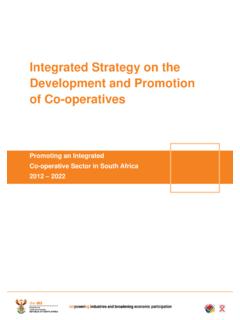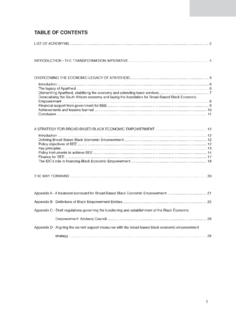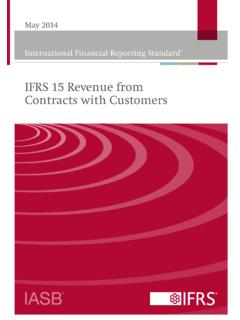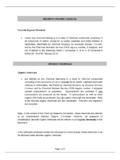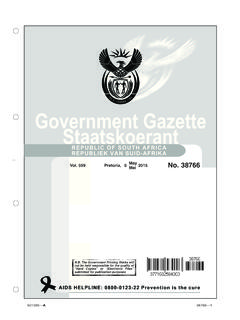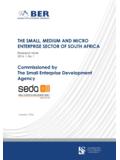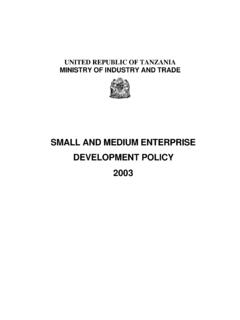Transcription of White Paper 1995 - Department of Trade and Industry
1 NOTICE 213 OF 1995 PARLIAMENT OF THE REPUBLIC OF SOUTH AFRICA White Paper ON NATIONAL STRATEGY FOR THE development AND PROMOTION OF small BUSINESS IN SOUTH AFRICA CAPE TOWN, 20 MARCH 1995 WPA/1995 The White Paper on National Strategy for the development and Promotion of small Business in South Africa is hereby published by the Department Trade and Industry for general information. This White Paper was tabled in Parliament on 20 March 1995, reference WPA/1995. 16317 28 MARCH 1995 ---------------------------------------- --------------------------------------- NATIONAL STRATEGY FOR THE development AND PROMOTION OF small BUSINESS IN SOUTH AFRICA White Paper of the Department OF Trade AND Industry 20 March 1995 Table of Contents Abbreviations Foreword PART ONE Process and vision The process of strategy formation After the White Paper A broader vision Structure of the document PART TWO The small -business sector in South Africa's economic development Size and diversity of the sector Role and contribution of the sector Constraints facing the small -business sector Past support policies International input Research on SMMEs PART THREE Objectives and principles Objectives of the national
2 small -business strategy Stages of strategy formulation and implementation Setting goals for the national strategy Fundamental principles Targeting support PART FOUR Elements of the support framework Creating an enabling legal framework Streamlining regulatory conditions Access to information and advice Access to marketing and procurement Access to finance The physical infrastructure Training in entrepreneurship, skills and management Industrial relations and the labour environment Access to appropriate technology Encouraging joint ventures Capacity-building and institutional strengthening Differential taxation and other financial incentives PART FIVE Institutional reform The Department of Trade and Industry The National small Business Council The small Business development agency Wholesale funding agencies Restructuring the SBDC small -business support at provincial level Local authorities Local Service Centres NGOs and small -business support Organised business PART SIX Action programme An integrated view Short-term: Action since mid-1994 Short-term.
3 Fiscal year 1995/96 Medium-term developments 1996/97 - 1997/98 Medium-term developments 1998/99 - 1999/2000 Longer-term action 2000 to 2005 PART SEVEN Funding the national strategy The challenge Funding sources Leveraging programme funding Meeting the challenge INDEX of policy issues and institutions TABLES, DIAGRAM and LIST Table 1 Key objectives of the National small Business Strategy Table 2 Ten key principles underlying the government's national small -business strategy Diagram The national SMME-support strategy in perspective List of written submissions Abbreviations BNDC Bophuthatswana National development Corporation (North-West) CBO Community-based organisation CSBC Ciskei small Business Corporation CSIR Council for Scientific and Industrial Research DBSA development Bank of Southern Africa DTI Department of Trade and Industry EMA Export Marketing Assistance FRD Foundation for Research development GEIS General Export Incentive Scheme IBEC Informal Business Enrichment Centre IBTT Informal Business Training Trust IDC Industrial development Corporation IDT Independent development Trust IESC International Executive Service Corps KFC KwaZulu Finance Corporation LSCs Local Service Centres Nafcoc National African Federation of Chambers of Commerce Nedlac National Economic development and Labour Council NGO Non-governmental organisation NPI National Productivity Institute NSBC National small Business Council ODA Overseas development
4 Administration RDP Reconstruction and development Programme RIDP Regional Industrial development Programme RSC Regional Services Council Sacob South African Chamber of Commerce SADC Southern African development Community Safto South African Foreign Trade Organisation SBDA small Business development agency SBDC small Business development Corporation SMMEs small , medium and micro-enterprises SRIDP small Enterprise Regional Industrial development Programme US-AID United States agency for International development VAT Value-added tax ---------------------------------------- --------------------------------------- FOREWORD Since the elections of April 1994 the issues of economic empowerment and growth have been placed high on the agenda of the Government of National Unity of South Africa. With millions of South Africans unemployed and underemployed, the government has no option but to give its full attention to the fundamental task of job creation, and generating sustainable and equitable growth.
5 small , medium and micro-enterprises (SMMEs) represent an important vehicle to address the challenges of job creation, economic growth and equity in our country. Throughout the world one finds that SMMEs are playing a critical role in absorbing labour, penetrating new markets and generally expanding economies in creative and innovative ways. We are of the view that - with the appropriate enabling environment - SMMEs in this country can follow these examples and make an indelible mark on this economy. The stimulation of SMMEs must be seen as part of an integrated strategy to take this economy onto a higher road - one in which our economy is diversified, productivity is enhanced, investment is stimulated and entrepreneurship flourishes, This White Paper represents government's thinking about what it can contribute to the process of stimulating small , medium and micro-enterprises. We believe that the real engine of sustainable and equitable growth in this country is the private sector.
6 We are committed to doing all that we can to help create an environment in which businesses can get on with their job. We believe in the principle of working together with our partners in the private sector - big and small businesses - in realising our hopes and aspirations for this economy. We are under no illusion that we have all the answers to the problems of growth and redistribution in this country. Indeed, we are bound to make errors of judgement in the next few years. But we hope that our commitment to ongoing and serious consultation with all the major stakeholders will ensure that we are guided in the right direction. This document is the result of an intensive process of consultation with key stakeholders in the SMME sector. Pressures to deliver dictated very tight schedules for this communication process. The feedback which we received on the issues raised in the Discussion Paper of October 1994 made an important contribution to government's thinking on small , medium and micro-enterprises.
7 We believe that the programmes and policies outlined here reflect the aspirations of many small -business people in our country. But we do not intend to stop here. The White Paper will become a platform for even further consultations with stakeholders involved in small -business development . At the President's Conference on small Business in March 1995, we intend to present our programmes for public discussion and debate. May I express my personal thanks to the many individuals and organisations who have contributed to the development of this White Paper . Such tireless activity on the part of small -business entrepreneurs, the corporate sector, support institutions and all other players will prove to be invaluable for the policies and strategies in this White Paper to be translated into real progress in our economy and our nation. Finally, I am honoured to have the opportunity to present the White Paper on the National Strategy for the development and Promotion of small Business in South Africa to the first democratically elected parliament in the history of this country.
8 Trevor A. Manuel, MP Minister of Trade and Industry ---------------------------------------- --------------------------------------- PART ONE Process and vision The Reconstruction and development Programme of the Government of National Unity addresses a wide range of social and economic development issues, each of which deserves detailed attention and concerted action. The promotion of the small -enterprise sector of our economy is one of these critical areas. Not only is it of great importance for the rate of job creation and income generation in our country, but it deserves particular attention since the sector has been greatly neglected in the past - in particular black-owned and -controlled small enterprises. The process of strategy formation During the past few years several discussion papers and reports have been circulated among small -business support agencies in South Africa. Numerous conferences and workshops have been held to air the concerns of entrepreneurs and business associations, reflecting the full spectrum of small , medium, micro- and survivalist enterprises (SMMEs).
9 All along there has been a search for consensus about support needs, feasible programmes and a consistent national strategy. In October 1994 the Ministry of Trade and Industry released a Discussion Paper on Strategies for the development of an Integrated Policy and Support Programme for small , Medium and Micro-Enterprises in South Africa. This draft document outlined a strategy framework for discussion among all the stakeholders in the small -enterprise sphere. It already reflected inputs by many institutions active in this field, including government departments, business organisations, foreign donor agencies and policy experts. Between October and the end of 1994 about sixty workshops were held in both rural and urban areas to explain the contents of the Discussion Paper and encourage critical comments as well as practical proposals for adjustments to the strategy. These sessions, which were well attended and which were supplemented by numerous press comments on the document, gave rise to a large number of written comments, including submissions from virtually all the major business associations, the provincial small , medium and micro- enterprise (SMME) coordinators and several central-government departments.
10 All of these comments have been taken into account in the revision of the document, to become this White Paper . The focus is now more specifically on the role and programmatic approach of government, with greater focus on the expected unfolding of the national strategy and the mobilisation of the necessary resources. The publication of the Discussion Paper occurred at a time when many of the SMME-support policies that evolved in the past were already in a process of transition. The document itself and its widespread discussion further accelerated the reform process and gave rise to new impulses and initiatives. Feedback from these reform processes also influenced the final shape of this White Paper . As such, it should be viewed as a further significant milestone in a long-run transformation process, rather than a rigid framework document. After the White Paper Once it is endorsed by cabinet and parliament, the White Paper has to be carried across to the full spectrum of the small -enterprise community, which includes close to a million enterprises.

